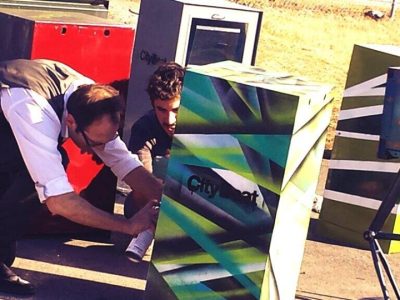I spot the wild doduo outside Reanimator in the early afternoon, its twin fuzzy heads bobbing stupidly on the screen of my phone. I had built up a small stable of them over the last couple days, but had amassed nowhere near enough candy to evolve one of them into… I don’t know… that thing doduos evolve into when you feed them 50 candies with the three heads. Dodrio. Yeah, that.
I’ve only known you can use these candies to evolve your Pokémon into better, tougher Pokémon for about a day — my 13-year-old son showed me a couple nights before, along with a few other tips gleaned from his years collecting the cards, watching the shows, playing the games and soaking up whatever other crap Nintendo dished out in what I always thought of as the most annoying anime franchise ever.
But now, god help me, I’m hooked.
It’s hot out. Super hot, and my hands are slick with sweat, the screen of my cell phone gummy with the midday humidity. I launch pokéballs at the doduo, one after the other: wide right, wide left, too short, too long. When I do land one, the doduo wriggles out of the ball’s grasp like a dog taking off a sweater. After maybe 10 shots, I hit my strike, but before the pokéball shivers to acknowledge my capture, my game freezes up. The contest plays out as an unseen algorithm — I’ll have to restart and check my pokédeck to see if I got him.
And that’s exactly what I do.

Looks like I missed him — a huge waste of pokéballs, so I load up at the pokéstop by the bike shop, commemorating a piece of art that is no longer there, and head west looking for trouble.
I loop behind Krankies on Fourth Street and pick up a weedle on the first toss, thank you very much, and a pokéstop at the downtown Winston-Salem Reynolds Building, now the Cardinal Kimpton Hotel, is good for three pokéballs and an ekans lurking near the corner. Resource-rich Fourth Street replenishes my virtual backpack with balls and potions, and while I’m walking, a rare omanyte, which is like a snail or a hermit crab or something, hatches from an egg I’ve been incubating for 10 kilometers.
I add another zubat to my deck, as well as a squirtle, a male nidoran and — squee! — an abra, which looks like a sleeping yellow kangaroo. I’ll have to ask my son about it when I get home, before we go on the evening hunt.
Yeah, okay, fine. I admit it: I’m one of those. I downloaded Pokémon Go just a few days after it broke on July 7. I love playing games on my phone, and I figured my kids would be into it. I had a small notion, that day, that something like a phenomenon was going on. The app had already hit 15 million downloads, though I had yet to understand what that meant.
I still can’t quite comprehend it.
Just one week in, Pokémon Go is the fastest-growing mobile game in history and expanding rapidly — 5 percent of Android users are on it every day, and more have downloaded it than Tinder, making it, by marketing standards, more popular than sex. It’s eating into Facebook’s user pool — Have you noticed things have been quiet there lately? — and sucking up bandwidth once devoted to Netflix and porn.
Everyone has noticed more people on the streets, wandering through neighborhoods and discovering landmarks that have been there for decades. They’re talking to each other — sure, they’re talking about ridiculous cartoon creatures and imaginary locations, but they’re talking to each other! Even my 16-year-old son, who spends so much time on the couch there’s a sweat imprint of his body on it, wandered out into the yard, rubbed his eyes against the sunlight and walked to the end of the block to see if there were any water Pokémon in the creek.
It’s the most exercise I’ve seen him get all summer.

The Summer of Pokémon could not have come at a better time, if you ask me.
Right now the real world is a huge drag. Concurrent with the game’s release have been two police shootings of young black men; two incidents of shootings against law enforcement, a terrorist attack in the south of France and a failed military coup in Turkey.
And in case anyone hasn’t noticed, there are two people running for president of the United States that everyone seems to hate.
Facebook and Twitter have devolved into political cesspools; everybody’s already finished the new episodes of “Orange is the New Black”; and football season doesn’t start for another seven weeks, unless you count pre-season, which I don’t.
And then there’s me.
Both personally and professionally, my life is a juggling act of stress and responsibilities; sometimes I get so deep into the grind I forget that anything else exists.
I have been using video games as a means of escape since I got my first home-version of Pong when I was 8 years old. By the time Space Invaders came out, I was dumping quarters into the machines at arcades, bowling alleys and pizza joints. Around 1979, two years after it launched, the Atari 2600 began heavily saturating the market. My parents had the same attitude about video games as their parents had about rock and roll: a trashy trend that would surely rot your brain, and they promised that I would never own one.
True story: I won my Atari 2600 in 1982 in a box of Cap’n Crunch. It was one of the best things that ever happened to me, and a total burn on my parents.
I’ve played them all: Intellivision, ColecoVision, Vectrex, Sega. I’m pretty sure I can still trap the koopa troopa shell and get a ton of free guys in Super Mario Brothers, and I am unbeatable at Tecmo Bowl.
I still try to log some hours on the PS4 when my boys aren’t using it — I like virtual pinball and superhero games — and I play video games on my phone, sometimes to the point of compulsion. That’s why I had to get rid of Candy Crush. But I’ve always got like 10 Words With Friends going, and I am a champion triple towers player.
My lifestyle and history make me part of a prime segment for Pokémon Go — even though I know next to nothing about the franchise, its characters or its lore. I was 25 when Pokémon came out in 1995, and can say for sure that it did not raise a blip on my radar. But anyone born between 1985 and 2005 is steeped in the canon — Pikachu and whatnot — and they’re out there now on the streets, playing it. So are their mothers and fathers, their roommates and boyfriends and girlfriends.
It’s tapping into sentiment for these characters, this Pokémon universe, yes. But what’s being mined is something much more.
So, channeling my inner 13-year-old, I downloaded the game and named my hunter HoofHearted13, which is funnier if you say it fast.

Every night last week I came home from work, grabbed my 13-year-old and went Pokémon hunting. Sometimes his brother or his sister came with us, sometimes my wife. On Monday and Tuesday we spun to the Pokémon stops at Barber Park in Greensboro along with a small family and a trio of college kids. On Wednesday we stopped through downtown and hit all the spots at Center City Park and along that stretch of Elm Street with dozens of other nerds. A driver headed south on Elm leaned out his window to shout that a rare kabuto had been spotted around the corner. Three separate groups of hunters peeled out of the park to chase it down.
In that time I became initiated into the fold.
The main object of Pokémon Go is to catch Pokémon — cute little monsters that exist as snippets of code on a massive server that randomly “show up” in various locations across the country, seen only through the user’s phone while the app is running. It’s basically like walking around in Google Maps. When a Pokémon gets close while the app is running, the on-screen display reverts to a target game: You pitch the pokéball with your thumb or finger and try to hit the little bugger with the ball, which traps the Pokémon, secures its stardust and candy, and registers it in the pokédeck.
Seriously: Have you not done this yet?
You can use the candy and stardust to power up the Pokémon, or hoard a bunch of the same type of candy and evolve the Pokémon into something else, another species more powerful than the last. The purpose of this process is to train up your guys to fight in gyms, which are strategically placed in public spaces. Also scattered everywhere — churches, libraries, public art installations, stores, memorial plaques, random street corners — are pokéstops, which spin out goodies like extra pokéballs, potions and crystals that restore power, incense that attracts the wild creatures, Pokémon eggs.
This facet of the game is what’s been bringing people out into the streets to discover hidden monuments and architectural features they had never noticed before in their own neighborhoods. It’s what’s been driving business at places like Bull’s Tavern in Winston-Salem and Eclectic by Nature in Greensboro. It’s done more to promote our center cities than any downtown organization in the Triad could have done so quickly and broadly.
Just a week in, and Pokémon hunting groups and bar crawls fill Facebook event pages. Parties converge around pokéstops, and people set off modules that attract wild Pokémon in the way people used to light joints. Bars and restaurants are running Pokémon-themed specials and there haven’t been this many people using our public parks all summer. A downtown Pokémon Center has opened in the Empire Room, offering refreshments for hunters as they traipse through the city streets. Downtown Winston-Salem, with even more pokéstops, has been crawling with hunters every night since the game came out.
This is a genuine phenomenon along the lines of the hula hoop — except it took the hula hoop four months to hit 25 million units back in the 1950s. More than 15 million iPhone users had downloaded the game in the first six days, and more than 10 million downloads on Android devices as of Sunday.
That’s more than the population of Australia.

On Thursday night at Geeksboro, the big room hums with Pokémon players, staring into phones at the tables, on the couches. They’re gathered out front, mingling with the customers waiting in line at Hops Burger Bar and walking down to the gym at Acme Comics, one of the toughest in town. Someone’s set off a lure module at the Geeksboro pokéstop, and the little buggers are everywhere.
My 13-year-old engages with the counterman, perhaps in his twenties, about the cards they’ve collected over the years, the monsters they hope to catch, how knowledge of the Pokémon universe translates to success in the Pokémon Go game.
My son, who regards me with something like pity due to my relative inexperience with the game, says, “You see, I speak the language.”

On Thursday morning, I begin my day around sunrise by starting the coffee pot and taking in the first cigarette of the day. Then, while everyone else is still sleeping, I drive my car slowly around my neighborhood, hitting every pokéstop in the vicinity to re-up my supply of pokéballs. I had run out the night before while chasing Pokémon in the yard, and had missed out on capturing a pikachu — sort of the poster boy for the franchise, a round, yellow rodent-looking thing. My son tells me that a pikachu is nothing special, no great powers or anything, but the blown opportunity haunts me.
You shouldn’t Pokémon while driving — it’s even more distracting than texting or Facebooking — but dammit, I need those balls. How the hell can I catch Pokémon without them?
By now, the news cycle is filled with warning stories about the dangers of the game: cell-phone robberies at pokéstops, hunters hit by moving cars while transfixed on their screens, nasty incidents of trespassing. In California, two men fell off a cliff while chasing Pokémon — the LA Times report neglected to mention what type of monster they were chasing. Thus far, four groups of Pokémon hunters have come across dead bodies. The internet is already full of articles from American Christians denouncing the game for its occultish tendencies. Even more pages detail the security risk the game poses by exposing your data — virtually all of which is already available to every other app on your phone.
I’ve noticed the app sucks data and eats power. But my biggest problem is that I keep running out of balls. So I get in the habit of running this early-morning recon that culminates with a drive through the entirety of the Revolution Mills campus, where a handful of pokéstops and a gym at the water tower await.
More nuances of the game reveal themselves over the days. I’ve been evolving and powering up a small crew of fighters: a pinsor that I caught on the first day and renamed Mr. Pinchy, a pidgeot that I raised from a small pidgey and equipped with a hurricane attack, a kick-ass vaporeon that I sold off a bunch of evees in order to evolve.
Thus far I’ve been unable to win a battle — I’ve been stopping at gyms here and there, sacrificing Mr. Pinchy and a powerful raticate I’ve trained up in efforts to learn how to fight. There are no practice screens, no real instructions on how it’s done. The only way to learn is to take a beating.
After ascending to Level 5, each Pokémoner must choose a faction — without getting into too much detail, they are red, blue and yellow. I went with blue. No real reason.
But the factions take an important role in the game: Teams can capture gyms and hold them by fending off challengers. And battling is the most lucrative endeavor in the game: Players can earn golden coins by holding down a gym, for buying more pokéballs, incense, modules and other useful items. The only other way to get gold coins is to buy them, about a penny apiece and 1,200 of them for about $10. In this way, though the game is absolutely free to play, Pokémon took in more than $14 million in its first week. In the first couple days, parent company Nintendo saw its stock rise 25 percent, an increase in market value of $7.5 billion. The real-world merchandise hasn’t even kicked in yet, but expect to see a rash of Pokémon T-shirts and snapbacks all over the place by the end of the summer.

By Sunday night, I’m a Level 12, with 40 of the 138 Pokémon logged into my pokédeck. But I still have not landed a win at a gym. At the office and out of pokéballs once again, I’m compelled to get in my car and drive slowly up Elm Street, pausing slightly at each pokéstop to reap its bounty. (Note: Never do this).

I’ve suffered through two crashes at this point — the Great Saturday Afternoon Pokémon Crash, which took out servers for the bulk of the day, and for which a hacker group named PoodleCorp took credit, and another drop that lasted a few hours this very afternoon, which happened when Canada came online.
Plus, my sons have been gaining on me — they’ve both cleared Level 5 and are starting to master their moves in the gyms. And I know if I don’t learn to fight soon, I will be a laughingstock in my own home.
I’m loaded for bear, so I swing past the Green Hill Cemetery off Smith Street, where an amazing trove of pokéspots hooks me up and move north back to Geeksboro, where someone’s set off a lure module. I get a coffee and pick off a few creatures, including a polliwog, which is like a beaver or something with a weird spiral on its breast.
And then I gird myself and head for the Acme Comics gym, by now in control of the yellow team — Team Instinct, I now understand — with a low-level raticate defending it. The game puts together six of my best Pokémon, and when the fight begins the first two, a pinsir and a fully evolved pidgeot, barely make a dent. It is my third fighter, the vaporeon, that racks my first victory by, I think, shooting water out of its head — it’s hard to tell, it all happens so fast.
The whole thing takes less than a minute, but it’s enough to give me my first battle victory, even if I don’t quite understand how I did it, and the experience points push me over the threshold to Level 13, respectable by any standards.
I put the phone down then, because I need to get home to lord it over my kids.
Join the First Amendment Society, a membership that goes directly to funding TCB‘s newsroom.
We believe that reporting can save the world.
The TCB First Amendment Society recognizes the vital role of a free, unfettered press with a bundling of local experiences designed to build community, and unique engagements with our newsroom that will help you understand, and shape, local journalism’s critical role in uplifting the people in our cities.
All revenue goes directly into the newsroom as reporters’ salaries and freelance commissions.





Leave a Reply